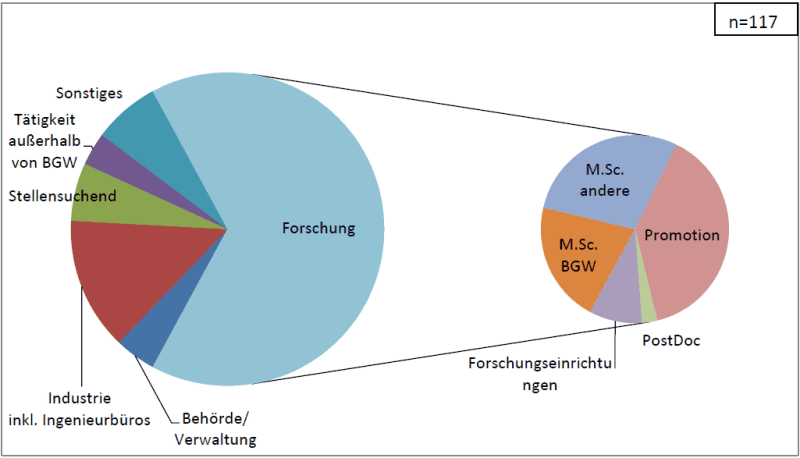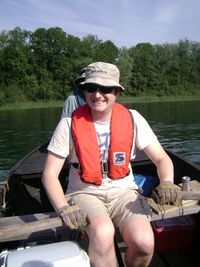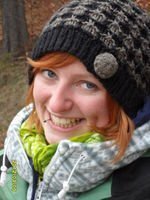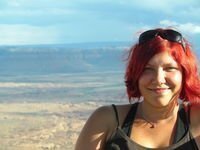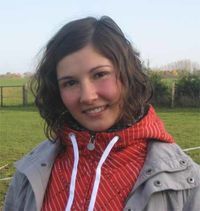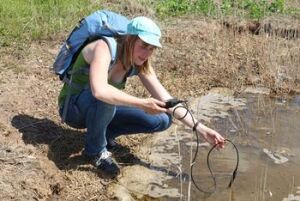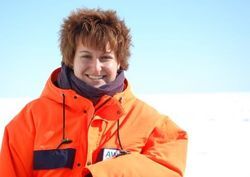Career perspectives
Professional fields
Graduates bring comprehensive subject-specific scientific and methodological skills. In addition, they have the communicative skills to present science to the public and to sensitize society to environmental pollution. Through the possibility of a semester abroad, they gain important intercultural skills.
Jena biogeoscientists are excellently equipped for work in a wide range of professional fields, such as nature conservation, remediation of contaminated sites, and environmental education. In addition, master's graduates can pursue doctoral studies in Germany and abroad, especially in the fields of geosciences, biology and chemistry.
- Engineering offices for subsoil investigations, hydrogeology, remediation of contaminated sites
- Oil and gas industry, raw material supply
- Research coordination
- Research institutions
- Public relations, museums, geoparks
Detailed info can be found herepdf, 81 kb · de.
Evaluation of the survey of graduates in April 2016
Image: IGWAlumni portraits
-
Slavko Pasalic (M.Sc. Biogeosciences)
Slavko Pasalic (M.Sc. Biogeowissenschaften)
Image: Slavko PasalicJust when I was faced with the difficult decision of whether to study biology or geology, I heard by chance about the then new degree program in biogeosciences. It was immediately clear to me that this combination of both desired fields was exactly the right thing for me.
During the bachelor's program, my expectations were fully met and I decided to do my master's degree in Jena. Originally, I wanted to go into research, but during the master's program my interests shifted. So I started looking for work in the private sector.Due to my focus in the final theses in the field of analytical chemistry, I also looked for corresponding jobs. Through an internship in the environmental analytical laboratory at Eurofins in Jena, I got the chance to join Eurofins in Freiberg, where I worked as an employee in the project secretariat/test management group. There I mainly wrote test reports, looked after customers, prepared quotations and checked laboratory results.
After a good two years, I changed jobs and am now working as a research assistant at the Research Institute for Leather and Plastic Sheeting (FILK) in Freiberg. The scope of duties is almost the same as at Eurofins. Since I completed an apprenticeship in the plastics industry before my studies, I can now apply the knowledge from both professions combined here.
-
Julia Lindner (M. Sc. Biogeosciences)
Julia Lindner (M. Sc. Biogeowissenschaften)
Image: Julia LindnerThe nice thing about biogeosciences is that you get the opportunity to learn about many topics, both in theory and in practice.
After my bachelor's degree, I therefore stayed in Jena to be able to deepen the biological background during the master's degree without having to give up the diversity. Through the professional internship in the 6th semester of the bachelor's degree, I came into contact with the Thuringian State Institute for Agriculture (TLL) for the first time, which was then followed by several student assistantships. When I was able to get a job in the EVA project of the TLL shortly after my graduation, I benefited from what I had learned during the last years: Since many topics are touched upon during the studies, one quickly learns to familiarize oneself with new topics. The EVA project is, similar to the study, an interdisciplinary project, which links agriculture, ecology, economy and politics. It is also a cooperation of different levels of science (universities, state institutions, independent engineering offices).
My task is to evaluate, in cooperation with my colleagues, the data accumulated over 10 years at our site in Jena, to coordinate the further course of the experiment and to present the project to the public. My work therefore gives me the opportunity to work both scientifically and practically and thus offers me just the right amount of variety that I have been looking for in my professional life.
More info: www.eva-verbund.deExternal link
-
Franziska Mosebach (Dr., M.Sc. Biogeosciences)
Franziska Mosebach, geb. Schäffner (Dr., M.Sc. Biogeowissenschaften)
Image: Franziska MosebachMy decision for Jena and the course of studies depended on several factors. On the one hand, I had focused my Abitur very scientifically and I also wanted to study something in this direction and on the other hand, I already had friends in Jena who also studied here, and so I could get to know the advantages of Jena as a student city while I was still at school. The course of studies in biogeosciences was newly offered in Jena at that time and I was one of the first who were allowed to start this study. The attraction for me was clearly the innovative idea of combining different disciplines and thus having the opportunity to work in a very diverse way.
I then completed my master's degree in Jena and had the great opportunity to receive a scholarship during my master's degree via the "fast-track" procedure, which allowed me to start my doctoral thesis directly in the field of biogeosciences and thus save one year of study time. During the PhD, I had the opportunity to participate in various projects abroad (e.g. Sweden, Wales, Sardinia) and then also completed a three-month research stay in Sardinia. While still working on my doctorate, I then took a "little breather" for a year when my son was born. After parental leave, I finally finished my PhD and was hired as a research assistant here at the Institute of Geosciences in the Applied Geology group. Since then, I have had the opportunity to continue working on various environmentally relevant issues in a research-oriented manner, as well as to teach biogeosciences and geosciences, teaching students the various methods mainly in the field. The work is very varied and it is nice to now be able to pass on the knowledge about biogeosciences to other students.
-
Steffi Rothhardt (Dr., M.Sc. Biogeosciences)
Steffi Rothhardt (Dr., M.Sc. Biogeowissenschaften)
Image: Steffi RothhardtFor me, the study of biogeosciences offered the perfect, varied course program. Numerous lectures, seminars and field exercises later, I started my doctorate at the Institute of Geosciences and meanwhile had the opportunity to do research at the Mineralogical Institute in Paris for three months. After a short stay abroad in the framework of development cooperation in Cameroon, I started working as scientific coordinator of the International Max Planck Research School for Biogeochemical Cycles in Jena in early 2014. I am very satisfied with the varied tasks and the international working environment.
Further information (Max Planck Institute for Biogeochemistry)External link
-
Stefan Neumann (M.Sc. Biogeosciences)
Already in my childhood I was very interested in nature and the environment. Therefore, it was clear early on that I would also orient myself in this direction when choosing my field of study. I finally decided to study biogeosciences because of the broad interdisciplinary education. From my point of view, this is particularly important, because in order to understand the processes taking place in the environment, it is always necessary to consider the interactions between the individual environmental compartments.
During my studies and in various internships, I became interested in the topic of contaminated sites. In the treatment of contaminated sites, geological and hydrogeological as well as chemical, but also microbiological knowledge is required. Since this is also a very interdisciplinary discipline, I deliberately chose to work in this field when choosing my career.
My task as a specialist for water supervision/soil protection/legacy at the environmental protection department of the city of Jena is first and foremost the protection of surface waters. In order to protect the waters from harmful interference, I provide water-legal approvals with the corresponding conditions that enable the harmless use of the waters.
Another focus of my work is the implementation of the European Water Framework Directive in cooperation with the responsible water body maintainer. The aim is to achieve a good chemical and ecological condition of the water bodies of the second order in the urban area of Jena.
Furthermore, I am involved in the preparation of flood protection concepts for the districts of Jena threatened by floods within the framework of the European Flood Risk Management Directive. In addition to preventive soil protection, I am also responsible for the elimination of harmful soil changes at the lower soil protection authority. This includes, above all, the supervision of urban remediation measures. I also manage the Thuringian Contaminated Sites Information System (THALIS) for the urban area of Jena and provide information on the registered suspected contaminated sites in accordance with the Thuringian Environmental Information Act.
-
Laura Degenkolb (M.Sc. Biogeosciences)
Laura Degenkolb (M.Sc. Biogeowissenschaften)
Image: Laura DegenkolbI decided to study Bio-Geo-Sciences because I wanted to contribute to counteracting man-made damage to nature and the environment as effectively as possible.
Initially, climate change was the central issue that moved me and led to my decision.
Later, however, I was also fascinated by renaturation projects, for example in the Ronneburg uranium mining area.
In my studies, I was able to further my education in this direction, both practically and theoretically. In addition, I gained the necessary basic knowledge in the natural sciences to be able to quickly familiarize myself with many other areas.
This is now a great advantage when choosing a career: I can target a wide range of different fields of activity. For example, after completing my master's degree, I started with an internship at the Operating Company for Environment and Agriculture in Saxony, where it also became apparent that I could do well here with my study knowledge. After this internship, I still hope to be able to take over the determination of phytoplankton within the scope of the implementation of the Water Framework Directive in the department of aquatic ecology at the same company.
-
Christina Jeschke (M.Sc. Biogeosciences)
I became aware of the study program Biogeosciences through my work as a student assistant at the "Jena Experiment". There I could participate in the field work as well as in the scientific evaluation of the results. Afterwards I informed myself about natural science courses of studies, which integrate a practical application and later offer various occupational fields. The bachelor's and master's degree program in biogeosciences in Jena provides a very structured way to do this. Jena is not only a multicultural center, but also a traditional and current industrial and scientific location (my region of choice), which is why I decided to study there.
Due to the integration and interaction of different natural sciences, a broad spectrum of knowledge is imparted during the studies. Opportunities to further educate or specialize in individual subject areas and to learn personal professional skills should be taken advantage of through term papers, internships, and hi-vis jobs or other small temporary jobs. This is also a good way to master the transition from university to work.
After graduation, I decided to do in-depth scientific research in isotope geochemistry, with practical application in the remediation of contaminated mining sites. Currently I am working in an engineering office (BIGUS GmbH Weimar) in the field of environmental engineering. The main focus there is the environmental assessment of contaminated sites and the supervision of work in contaminated areas, such as the specification of work and safety plans.
After graduation, it is not only technical qualifications that are decisive. An applicant's personal interest, motivation and commitment also play an important role in getting the job of his or her choice.
-
Sina Bold (B.Sc. Biogeosciences, M.Sc. Biological Oceanography)
Sina Bold (B.Sc. Biogeowissenschaften, M.Sc. Biological Oceanography)
Image: Sina BoldAfter my Bachelor of Biogeosciences at the FSU Jena and the University of Eastern Finland Joensuu, I completed an international Master in "Biological OceanographyExternal link" at GEOMAR, Helmholtz Centre for Ocean Research Kiel, in cooperation with the Christian-Albrechts University of Kiel. During this time I remained faithful to the biogeosciences and biogeochemistry. Among other things, I had the opportunity to participate in a five-week ship expedition with the Polarstern to the Fram Strait, which represents the transition from the Atlantic to the Arctic Ocean. There, I was part of a research group studying plankton ecology and biogeochemistry in the changing Arctic Ocean.
Furthermore, I worked as a student assistant in the research group "Marine GeobiologyExternal link" at GEOMAR. There I also wrote my master thesis with the title "Sulfate Reduction and Nitrogen Fixation in Oil-Contaminated Marine Sediments".
Currently, I am studying "Science Communication" at Dublin City University, Ireland. I expect to complete this second master's degree in the fall of 2015.
Are you a biogeosciences graduate and ready to talk about your career choice experience? Then contact us at dirk.merten@uni-jena.de.
